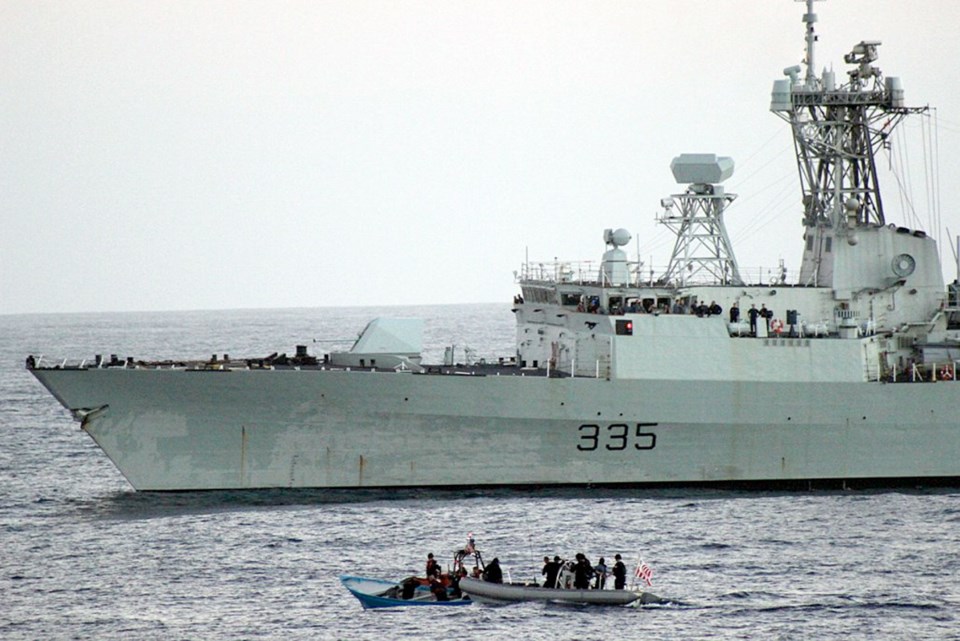Esquimalt-based navy frigate HMCS Calgary had just departed from San Diego on the first day of a multinational mission against trafficking and crime when it helped bust a million-dollar marijuana operation.
“I think this is the first time we’ve done an interdiction so quickly, literally in the first hours of being assigned to a mission,” said commanding officer John Wilson, from aboard HMCS Calgary southwest of San Diego on Tuesday.
The ship left Victoria Sept. 22 with about 200 sailors and will return mid-November.
“The crew is very motivated, really engaged to see the fruits of our labours and training. Also to see a significant amount of narcotics off North American streets.”
On Oct. 1, HMCS Calgary and the U.S. Coast Guard were alerted by a coast guard aircraft to a suspicious vessel about 60 kilometres away.
Calgary’s crew had just finished a briefing for the eight-day mission with Operation Caribbe.
Since 2006, Canadian warships have been part of the multinational mission to monitor suspicious vessels and intercept crime such as drug and human trafficking.
The Port Angeles-based U.S. Coast Guard cutter Active was first to approach the 35-foot panga boat. HMCS Calgary soon followed.
“As we approached, the [suspicious] boat came up in speed,” Wilson said.
“The boat had two big outboard motors, which is typical to transport illicit cargo, but one of the engines had problems.”
Two men on the boat, later determined to be from Mexico, started to throw bales off the boat and into the water, Wilson said.
“We knew it was a good probability they were drugs,” he said. The men did not have weapons and surrendered without incident.
The bales — 22 in the water and 28 stashed on board — contained marijuana with a street value of more than a million dollars.
“Unfortunately, this kind of thing is quite frequent … which is why we have joint interagency task forces,” Wilson said.
Meanwhile, naval leaders from around the world converged on Victoria this week for a conference about maritime security challenges in the Pacific, ranging from the narcotics trade and human smuggling to maritime boundaries, fisheries protection and natural disasters.
“A threat to one part of the region is actually a threat to the overall security of the region,” said Vice-Admiral Mark Norman, commander of the Royal Canadian Navy.
International co-operation was highlighted at the event as the Canadian navy faces delays in the national shipbuilding program and an interim period with several vessels out of commission.
Admiral Harry B. Harris, commander of the U.S. Pacific Fleet, said that terrorism is a concern on the Pacific and his country plans to increase its Pacific presence to 60 per cent of the naval fleet (up from 52 per cent).
“We face a very real threat from North Korea and their aspirations for nuclear weapons,” he said.
As for extremist organizations such as Islamic State, “what we consider modern naval weapons, terrorists don’t have that. But they’re creative people. They didn’t have an air force but 9/11 happened.”
Defence analyst David Perry said one of the greatest challenges facing the Pacific naval fleets and maritime security is the sheer size of the coast.
“It’s a significant distance to move and needs extensive logistics,” said Perry, noting having fewer frigates and supply vessels and a stalled shipbuilding program amidst budget cuts is not ideal.
“The other issue is with increasing immigration and communities moving back and forth, there could be more calls for government to assist in disasters,” he said. “And increased economic ties with other countries, like China, will bring an interest in making sure there are general rules of conduct.”
spetrescu@timescolonist.com



